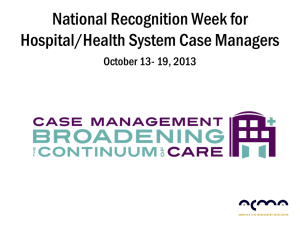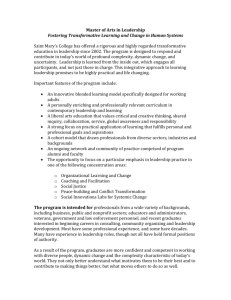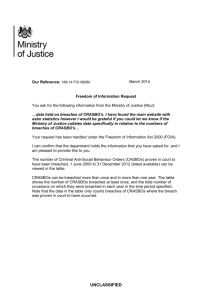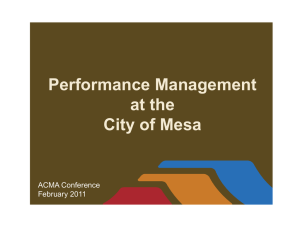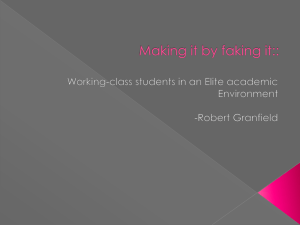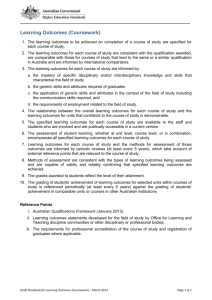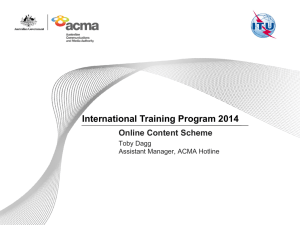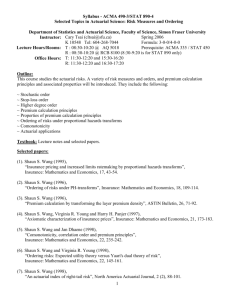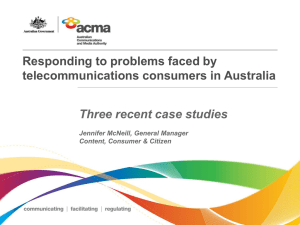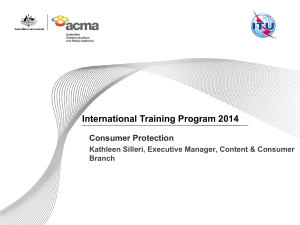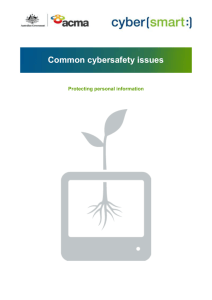Notes for Global Dialogue Conference Discussion
advertisement
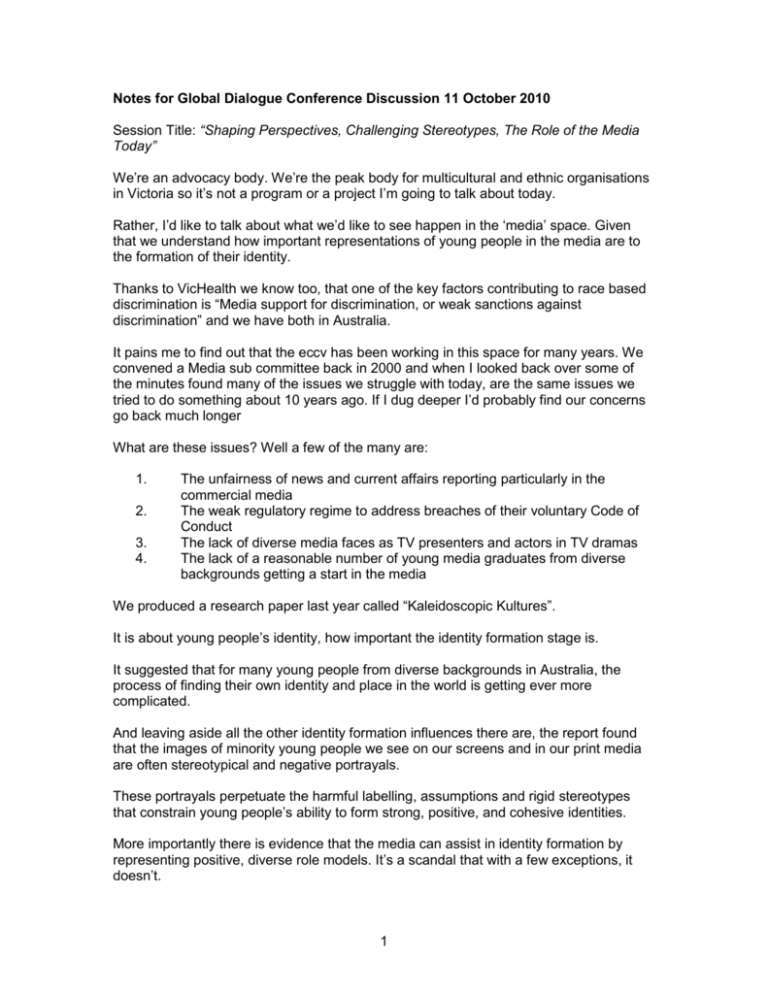
Notes for Global Dialogue Conference Discussion 11 October 2010 Session Title: “Shaping Perspectives, Challenging Stereotypes, The Role of the Media Today” We’re an advocacy body. We’re the peak body for multicultural and ethnic organisations in Victoria so it’s not a program or a project I’m going to talk about today. Rather, I’d like to talk about what we’d like to see happen in the ‘media’ space. Given that we understand how important representations of young people in the media are to the formation of their identity. Thanks to VicHealth we know too, that one of the key factors contributing to race based discrimination is “Media support for discrimination, or weak sanctions against discrimination” and we have both in Australia. It pains me to find out that the eccv has been working in this space for many years. We convened a Media sub committee back in 2000 and when I looked back over some of the minutes found many of the issues we struggle with today, are the same issues we tried to do something about 10 years ago. If I dug deeper I’d probably find our concerns go back much longer What are these issues? Well a few of the many are: 1. 2. 3. 4. The unfairness of news and current affairs reporting particularly in the commercial media The weak regulatory regime to address breaches of their voluntary Code of Conduct The lack of diverse media faces as TV presenters and actors in TV dramas The lack of a reasonable number of young media graduates from diverse backgrounds getting a start in the media We produced a research paper last year called “Kaleidoscopic Kultures”. It is about young people’s identity, how important the identity formation stage is. It suggested that for many young people from diverse backgrounds in Australia, the process of finding their own identity and place in the world is getting ever more complicated. And leaving aside all the other identity formation influences there are, the report found that the images of minority young people we see on our screens and in our print media are often stereotypical and negative portrayals. These portrayals perpetuate the harmful labelling, assumptions and rigid stereotypes that constrain young people’s ability to form strong, positive, and cohesive identities. More importantly there is evidence that the media can assist in identity formation by representing positive, diverse role models. It’s a scandal that with a few exceptions, it doesn’t. 1 So let’s talk about The unfairness of news and current affairs reporting particularly in the commercial media. That there is often unfairness in reporting is without doubt. We held a media forum in May to discuss these issues. It was prompted by the news that the Australian Communications and Media Authority (ACMA) had found that all 3 commercial TV stations in Melbourne had breached the code in that their reporting of an incident had “…created an unfair presentation overall of Sudanese people as being particularly prone to commit violence and crime”. We should note here that no Sudanese were involved in the story that was presented. All 3 stations were given a slap on the wrist and “persuaded” that they should expose the relevant staff to some training. And would any of the 3 stations come along to our forum to discuss the issues. NO ACMA also declined our invitation to be a part of the discussion. The second factor I raised earlier was: The weak regulatory regime to address breaches of the Code of Conduct Time and time again commercial media breaks its own rules and reports unfairly. There is a voluntary code administered by ACMA that says amongst other things, something like, “TV stations MUST NOT portray any person or group in a negative light by placing gratuitous emphasis on age, colour, gender, national or ethnic origin etc…” You will have seen that channel nine’s “Footy Show” was found to have breached the code recently when Sam Newman ridiculed a Malaysian man on the basis of his colour and race. They also breached the code in March of 2009 in much the same way on the grounds of gender. Even after a second breach they were only required to provide some staff training But you’ll all be happy to hear that they agreed to pay $200,000 to charity…….. IN THE EVENT OF ANY FUTURE BREACHES As well as its regulation role ACMA is supposed to ‘foster an environment in which the electronic media respect community standards and respond to audience and user needs” Not much sign of that! And in the first example I gave you, ACMA took 2 years to investigate and come to a conclusion. The third issue is the lack of diverse media faces as TV presenters and actors in TV dramas Andrew Jakubowicz has written some great stuff on the lack of diversity in casting. Like him I believe that Australian screens should reflect the cultural diversity of the Australian community. 2 Where there is diversity it tends to be imported. Broadly the Australian commercial media fails us. Look at most of the programs aired in prime time. Packed to the Rafters, Neighbours, Two and a Half Men. The US and the UK are miles ahead of us – look at shows like NCIS. While it has white male leads it does have Hispanic females and black males in key roles. The ABC has charter responsibilities on this issue but does little. It should ensure that its productions cast performers belonging to all groups in all types of roles, so that the Australian community is portrayed realistically on the screens of our national broadcaster. SBS stands out as an exception to the rule – it’s not exemplary by any means but they do have: Luke Nguyen East West 101 And newsreaders Anton Enis, Janice Peterson, Lee Lin Chin and Ricardo Gonsalves for instance. Finally, the lack of a reasonable number of young media graduates from diverse backgrounds getting a start in the media We’ve found it very difficult to get much information about the numbers of media students or recent graduates. Anecdotally we are told that new graduates from diverse backgrounds find it very hard to get jobs in the media. It’s apparent that in the print media in particular new job opportunities are few as circulations go down. They tell us that they feel discriminated against when applying for jobs. I can’t say to what extent this is true but we do know that anyone with a non Anglo name can expect to get many more rejections when applying for a job before he or she will get an interview. So what about some solutions? Firstly, we need our own solutions but we can look at what’s happening in other jurisdictions. In Europe the Committee of Ministers of the Council of Europe in 2008 began 2 campaigns, one called “All different, all equal”, the other “Speak out Against Discrimination”. Both were aimed at working with the media and media professionals across 47 member states to fight against media discrimination. One objective was to “Prepare and train media professionals through partnerships with training schools for journalism to be better equipped to work in a multicultural Europe”. And the other is: “To contribute to an enhanced expression of diversity by giving strong support to access for people from minority backgrounds to the media professions and to media productions”. 3 In Norway, there is more than a voluntary media code of conduct. Through Privacy Laws they specify that publications “must always respect a person’s character and identity, privacy, race, nationality and beliefs” The UK seems to be however, the only jurisdiction where their media regulatory body (Broadcast Training & Skills Regulator) really has any power when it comes to recruitment in the media industries. Section 337 of the UK Communications Act requires licensed broadcasters “to make arrangements to promote equal opportunities in employment on the basis of gender, race and disability” They have an annual reporting requirement which makes broadcasters records on these issues public. So there are plenty of ideas out there and we can take note of them, see how well they operate and choose how we deal with our own problems. I guess first though we need some political will and the only way we’re likely to get that is through a campaign. One last point: I have no doubt there will need to be a different approach as we go further and further into the uptake of the ‘new’ media. Perhaps we have to start by finding new ways of instilling and re- embedding the first principles of journalism in the culture of modern media. As I understand it they are: Telling the Truth Being independent and Fair Doing no harm 4
